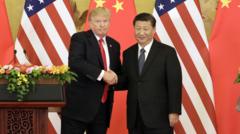Tension grows between the U.S. and Canada as President Trump's perspective on bilateral trade suggests a deep misunderstanding of economic interdependence, raising questions about the future of the relationship.
U.S.-Canada Trade Tensions Intensify Amid Tariff Disputes

U.S.-Canada Trade Tensions Intensify Amid Tariff Disputes
President Trump's views on U.S.-Canada trade relations spark controversy as the two nations navigate complex economic dependencies.
President Trump raised eyebrows last week with remarks suggesting that the United States does not need Canada as a trade partner. During a meeting with Canadian Prime Minister Mark Carney in Washington, Trump took to social media to question the fairness of their trade relationship, claiming unfair advantages for Canada.
He reiterated his belief that the U.S. is “subsidizing” Canada by $200 billion due to its trade deficit. However, this figure was misleading; U.S. data indicated a trade deficit of approximately $63.3 billion last year, and if energy exports were excluded from the equation, it would actually result in a trade surplus for the U.S.
Trump's assertion revolves around the belief that the U.S. can thrive independently of its northern neighbor. He stated on social media, “We don’t need their Cars, we don’t need their Energy, we don’t need their Lumber, we don’t need ANYTHING they have, other than their friendship.”
This sentiment underscores a growing rift between the two nations. As trade tensions rise, businesses in vital sectors like autos, energy, and lumber express concern over the implications of such hostility. The dialogue surrounding these tariffs raises pressing questions about the sustainability of the U.S.-Canada relationship moving forward.























